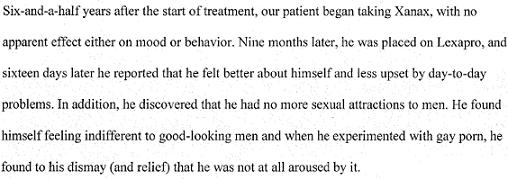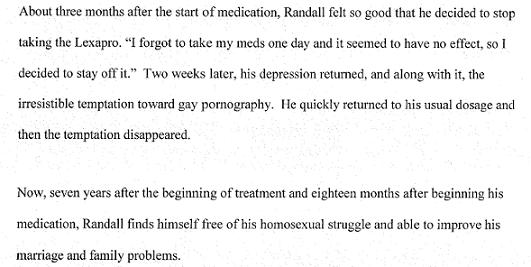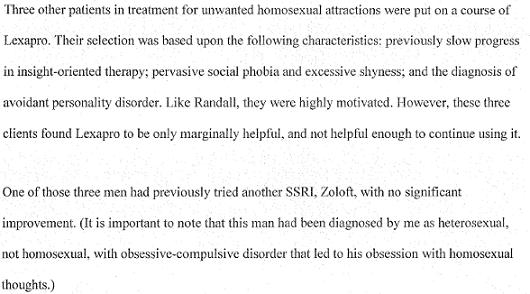During the recent NARTH (National Association for the Research and Therapy of Homosexuality) conference in Phoenix, organization President Julie Hamilton gave an award to Michel Lizotte, a Canadian journalist. The award was given because Lizotte has been “clearly presenting the research and providing hope and help to those who are seeking such help” in Canada.
I imagine other scientific groups give awards to non-scientists if they believe the recipient is doing a good job promoting the scientific claims and aims of the group. While it is telling that NARTH could not find a researcher to honor, I am sure there is precedent for such an action. However, what says a lot about NARTH is the type of “education” Mr. Lizotte has been presenting.
A look at Lizotte’s website (translated from the French via Google translation) indicates that he promotes the reparative drive theory of homosexuality. On this page, Lizotte posted videos of Joseph Nicolosi explaining the reparative theory. Lizotte claims research on homosexuality supports his views:
Several studies 2 have been conducted to understand the origin of homosexuality. The latest research 3 continue to accumulate supporting evidence that male homosexuality is not innate but acquired, that is to say, built during life, and most of the time – without the is the only reason – because of the failure of the process of tracing the sexual identification of the young son of his father, as a result of a dysfunctional relationship between the two, as we have described above .
Examining the footnotes tells you a lot about his efforts and NARTH’s decision to promote Lizotte’s work. Footnote 2 lists:
Stekel (1930), Rubenstein (1956), Bieber (1962), Ovesey (1969), Birk (1974), Pattison and Pattison (1980), Van Den Aardweg (1986) and others.
Stekel, Bieber, Rubenstein* and Ovesey were psychoanalysts who developed their theories about homosexuality, not from studies, but from a limited number of psychoanalytic cases. Bieber’s study has recently been compromised by revelations that one co-author, Cornelia Wilbur, conspired with a journalist to distort at least two case reports, including the famous case of Sybil. Bieber’s methods had been discredited because he relied on psychoanalysts who already believed homosexuality derived from deficient parenting. Furthermore, Bieber did not include non-patients and did not ask questions of the patients, but relied on case reports of the psychoanalysts.
Van Den Aardweg’s 1986 book reports the results of his cases treated with “Anticomplaining therapy.” He reports lots of successes but essentially these are his claims with no independent verification or peer review. Birk’s 1974 report comes the closest to a credible report of change but adds no new information about the “origins of homosexuality.” If anything, however, behavioral psychotherapist Birk would disagree with most of what is on Lizotte’s website about causes. In 1980, Birk reported that those who wanted to gain heterosexual capacity had some success but they were not free of homosexual behavior or feelings.
The reference to Pattison and Pattison is odd because the study had nothing to do with the origin of homosexuality and asked no questions about parents or causes. Instead the study claimed that 11 men had changed their orientation dramatically due to religious factors. However, that study has been compromised by revelations that at least two study participants recanted their stories of change within a year of the studies completion.
The reference number 3 lists the following as representing recent research:
Bene (1965), Biller (1974), Moberly (1983), Van der Aardweg (sic) (1986), Byne and Parsons (1993), Bem (1996), Whitehead and Whitehead (1999), Landolt (2004).
This is a very strange list. Bene’s very non-recent survey of gay and straight men found differences between gay and straight men on parental relationships. Biller’s book addresses much more than sexuality and proposes that paternal deprivation is behind a multitude of problems. These references, taken alone, support the reparative drive theory. However, as is typical of NARTH, studies which report contradicting findings are ignored in Lizotte’s list. For instance, when gay and straight men with low scores on a neuroticism scale were compared by Marvin Siegelman in 1974, the parental variables expected by reparative drive theory disappeared. More recently (2009), a Finnish study found that gay men rated their fathers as being warmer than straight men rated their fathers.
Continuing with the list: While Moberly theorized that same-sex parenting deficits caused homosexuality, she did no research to support her views. Van Den Aardweg is listed again (both old and recent research), Byne and Parsons reviewed the evidence for direct genetic factors in the development of sexual orientation but had nothing to say about the reparative drive theory. Bem proposed a theory that is a competitor to the reparative theory. Whitehead and Whitehead present no new research in their book on genetics. Reading Lizotte’s website, an uninformed reader might think that the reparative theory was well supported by research. An informed reader knows better.
The 2004 study by Landolt deserves mention since on the surface, it might seem to support reparative theory. The study examined attachment anxiety in gay men. According to the authors,
Several childhood factors are reported to be associated with a homosexual orientation in men, including gender nonconformity and rejection by parents and peers.
The authors then assessed these factors and found, among other things, a relationship between paternal and peer rejection and attachment anxiety. While this may seem like what reparative therapists would expect, it is also what one would expect in anyone, gay or straight. The study cannot be used as a support for reparative theory because the study did not use a comparison group of straights. I would expect that straight men who are gender non-conforming and rejected by their fathers would experience more anxiety in attachments. However, one cannot say anything about how gay men compare to straight men since the authors did not design the study to address causal factors in sexual orientation.
In short, Lizotte makes claims about homosexuality, supports the claims with old, poorly designed and/or irrelevant citations, fails to cite conflicting and/or newer research and then says that “the latest research” supports his position.
No wonder NARTH gave him an award.
*I cannot find a 1956 paper or book by an author with the last name of Rubenstein that would be relevant. There is a relevant paper by Rubenstein in the British Journal of Psychiatry in 1958. Even in this paper, there is no research other than case reports.


